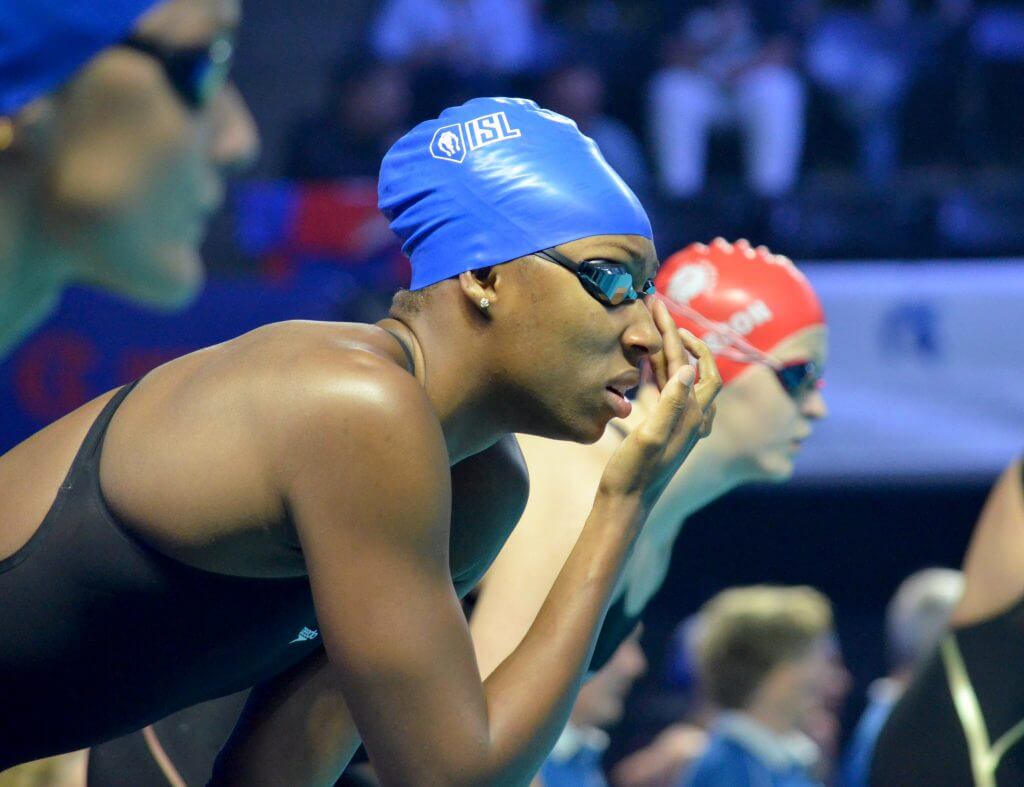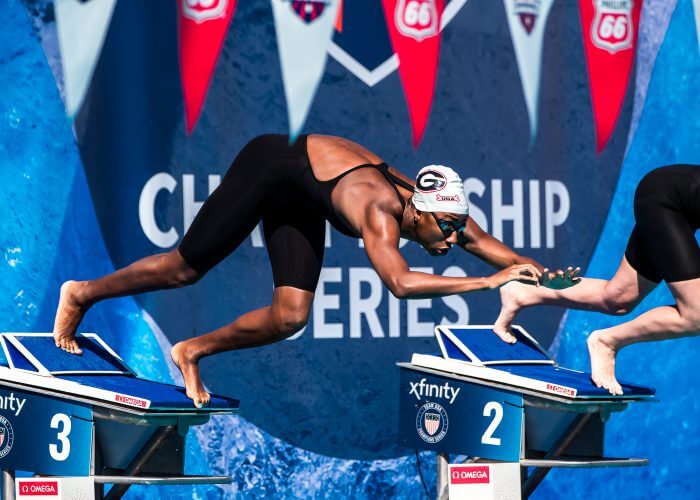Natalie Hinds Discusses ‘Fighting to be Equal,’ Using Her Platform in Fireside Chat With Elizabeth Beisel

Natalie Hinds has been an active voice in the Black Lives Matter movement, bringing her experience and unique perspective as a Black swimmer in the predominantly white sport of swimming.
Hinds, a 20-time All-American at Florida who is now part of Georgia’s post-grad training group, participated in a fireside chat with Elizabeth Beisel and CG Sports Management to discuss racial tensions in the U.S., her experiences with race and views on the current state of the conversation.
Racial equality has been an issue in the U.S. since the country began, and that battle for equality continues. It has made many strides but also has seen many roadblocks. In this time of social media and global awareness, the battle is much more visible.
“George Floyd was where the flashlight was turned on, and everything that was talked about it was on a video,” Natalie Hinds said. “The current climate is very tense. I can speak for myself and some of my friends, but we are tired and hopeless (at times). We are really just fighting to be equal and to be given the same opportunities. When you are fighting to hard day in and day out and not seeing the result, that is tiring. That is what has been going on for 400 years in our country.
“It is kind of emotional as well … Being a swimmer in a predominantly white sport just exacerbates it in my mind so I am just hyper aware of everything. I am the only Black swimmer on deck every day. That is something that I have always noticed, but now it affects me. All of those feelings you suppress as a kid.”
Hinds said there are situations that she sees all the time from people comparing her hair to a poodle, to specific comments about her race.
“I have had people tell me I was so articulate for a Black person. I try to take it as a compliment, but in reality, it is very hurtful,” Hinds said. “My first day in middle school, I actually had a Black person tell me I ‘spoke white.’”
Those kinds of feelings can take a toll on a swimmer. The events around the country have also taken a toll.
“We have a racial war going on in our country and it is interesting to see how people react,” Hinds said. “Some people put their heads in the sand, but at the same time, I have seen so many people who are the epitome of white privilege, but who have really opened up and asked the hard questions, which has made me happily surprised.”
“She has taught me so much over the past few months,” Beisel said. “If she can teach me this much, she can teach everyone else this much, if not more.”
It starts with teaching about Natalie Hinds’ experience growing up.
“I grew up in Midland, Texas,” she said. “I decided to swim when I was 4. I was the only Black person on my team pretty much the whole time. The way that my parents raised me was to be cognizant of other people, but young Natalie just wanted to win. Race was not on my mind.
“When I was 12, we started to travel to bigger meets in Dallas. We went to this meet and nobody was sitting next to my dad. He was isolated in the stands. When you are 12 and you swim and are in the warmdown pool, people are talking. For me that was never an issue because I like to talk and meet new people. But everyone turned their backs on me and didn’t let me into the conversation. It was pretty clear looking back. I wish I was more aware at the time, but I was 12. That same thing happened countless times.”
Subtle stereotypes continue to follow Hinds.
“People assumed that I play basketball or volleyball,” she said. “That happened daily. It was Black people, too. Then they didn’t want anything to do with me because I was swimming. It affects everyone, and Black people think they don’t belong in swimming.”
That is still a stereotype despite a growing group of African-Americans — including Hinds, Simone Manuel, Lia Neal, Cullen Jones, Anthony Ervin, Reece Whitley, Giles Smith and Shaine Casas — achieving elite status in the water.
One of the biggest moments was a 1-2-3 finish at the NCAA championships in 2015 in the 100 free for Manuel, Neal and Hinds. It was the first time a podium was comprised entirely of Black swimmers.
“It took a long time (for me to really put it in perspective),” Hinds said. “I was still on competition mode and I wish I spent more time to bask in being a part of history. “When it hit me that I could inspire someone to go into our sport, that is huge. It took me until after college to realize I had the platform for this. That is why when I came back to swimming, I had a fresh perspective.”

Natalie Hinds. Photo Courtesy: Connor Trimble
Even more importantly, the group is doing elite things out of the water, using their platform to help change within the sport and in the country.
It can start with a simple explanation of the sentiment behind the Black Lives Matter movement and dissecting the common response of “all lives matter.”
“People should not tolerate when they are told that ‘all lives matter,’” Hinds said. “They do matter, but at this point, Black lives really do matter. The comparison is if you neighbors house is on fire, you are going to help them put out the fire. Right now, Black lives are being lost for no reason, and they have been for the past 400 years. That is where those feelings stem from.”
The elite swimmers are trying to get that message across in a sport with few Black swimmers at the top. But those at the top are taking their platform seriously and hoping to help break down those stereotypes by continuing to push for diversity within the sport.
“Once COVID-19 clears up, I want to get out there in person,” Natalie Hinds said. “I love doing clinics and teaching kids. Black people not swimming is a stereotypical thing. For all of the kids who have parents who don’t want to learn how to swim and are afraid of the water only exacerbates the problem. (Talking to parents like that) was very eye-opening for me. Everyone needs to learn to be safe around water. Teaching kids is how I want to use my platform and break the barrier with older Black people who don’t know how to swim and feel like they shouldn’t be in the water.”



